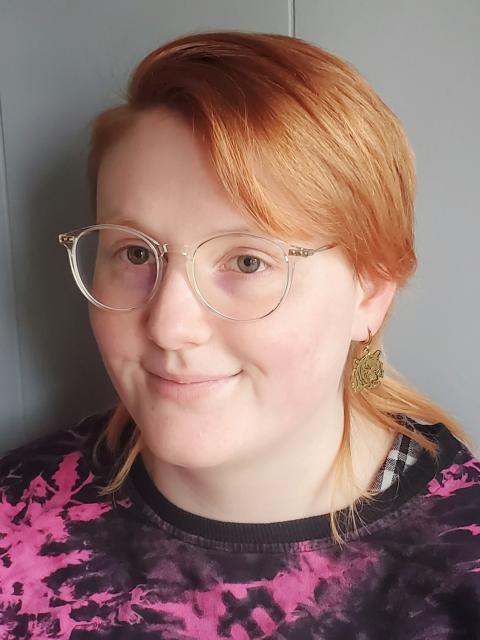In relationships, a decision, an unexpected event, a behavior can change everything, leading those involved down a path they may not have expected and are unprepared to handle.
At University of Wisconsin-Stout’s spring Stout Game Expo, from 6 to 9 p.m. Monday, May 2, on the Memorial Student Center’s second floor, visitors can explore the vagaries of relationships with Octopus Pot, a visual novel game created by Jackie Cummings.
Cummings, who will graduate Saturday, May 7, with a Master of Fine Arts in design, is one of more than 230 students who will be presenting more than 60 team and solo projects they’ve created in UW-Stout’s School of Art and Design. Board games, mobile games, computer games, 3D environments, virtual reality games and more — students invite the public to try them.
Another project, The King’s Race, a senior capstone project, is a fast-paced three-player racing game in which two runners representing toy characters race to the finish but face unexpected obstacles thrown at them by the king.
An arcade game called Sonataria, an independent Honors College project, tests players’ musical skills as they hit buttons to the beat of the music and spin a wheel to make the crowd cheer while using a custom-built game cabinet.
Ocotpus Pot blends fun, heartbreak
Octopus Pot is Cummings’ graduate thesis project, a computer-based, interactive experience that tells a story while making an adventure of it by giving the players options. It operates similar to online dating simulators, which Cummings says are fun to play.

Having experienced a relationship breakup, Cummings decided to use the common life experience as the basis for a game, but Octopus Pot also is more than a game.
“It provides a cathartic and compassionate look at relationship erosion and eventual breakup to people who’ve had that experience. Everybody has a breakup story, even if it’s not their own,” Cummings said. “I want some people to feel like it was a healing experience to play the game, and I also wanted it to be fun.”
Players experience the perspectives of both main characters, Maysa and Shelby, to help them see both sides of a relationship. They have “ownership of the narrative by deciding to do one thing over another” with what Cummings calls branching dialogue, or prompts that force the player to choose.
Octopus Pot is named after a term in Japan that refers to a medical condition exacerbated by emotional stress, what some call broken heart syndrome. “This game is about heartbreak,” she said.
Cummings, of Bemidji, Minn., based the game on more than personal experience. She did qualitative research, conducting a survey and interviewing people who have had breakups. The “affinity mapping” research provided themes to help Cummings determine how the game would play out, she said.
“The research told me what the characters should be feeling, and that’s what’s important,” she said.
A yearlong project
Cummings researched the game in the fall and created it this semester. Her thesis paper explains the history of the visual novel genre — popular in Japan — and empathy in games.
She earned her bachelor’s degree from UW-Stout in 2019 in game design and development-art, with a minor in art history and a focus on 2D game design. Octopus Pot, a 2D game, required Cummings’ skills in game design and in illustration and sequential art, the latter which was the focus of her graduate studies, she said.
Using the Clip Studio Paint software, she drew seven unique backgrounds and four characters, who change as the game progresses.
“Jackie’s illustration work is always top-notch. Her character design is thoughtful and full of personality, and she has a striking visual style that works really well for a project like this,” said Erik Evensen, director of the MFA in design program.
“With Octopus Pot, Jackie’s been able to weave together a focus in illustration, her passion for storytelling and her experience with game design to develop a project that is finely tuned to her specific creative abilities,” he added.
Octopus Pot has potential to be made into a commercial game with more work, something Cummings may look into. She’d also like to finish a comic that she started during an MFA independent study course.
Cummings is looking at career options, including teaching, with an MFA being a terminal degree in the field. “The MFA program definitely helped with my project management skills. I learned a lot about the nature of storytelling, how to outline a plot and five-act structure typical in dramas and stage plays. I did a lot of drawings. I do think I’m a better artist and better storyteller overall,” she said.


